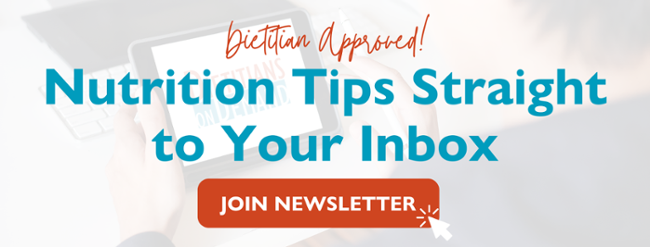Cancer, Patient Blog | Oct 10 2022
Debunking 5 popular cancer myths

Treatment of cancer is a complex process, particularly when it comes to nutrition. A simple Google search on ‘nutrition tips for cancer’ results in thousands of options, from more widely recognized sources such as the American Cancer Society to lesser-known references suggesting tips for curing cancer simply by eliminating some of the foods that you eat. Sorting through this information can be a struggle. Not only is there an abundance of information, but it can be difficult to determine what actually IS helpful regarding diet and cancer. Digging in, we’ll take a closer look at some of the popular cancer and diet myths to see what the experts and evidence say about each.
1. Sugar feeds cancer cells.
Largely pushed is the theory that sugar feeds cancer. Claims state to stay away from sugar and this not only starves the cancer cells but also limits your chances for cancer to reoccur. Experts suggest a different line of thinking. Many of the foods we eat are broken down into glucose and used for fuel in the body. Cancer cells aren’t the only type of cells to use this for energy however, other cells need glucose for fuel as well. Although sugar intake does not have a direct impact on cancer, too much sugar and a poor diet can increase risk for type 2 diabetes and excess body fat. This can increase risk for cancers. Studies show that to reduce overall disease risk a healthy diet is recommended, and this includes reducing intake of refined or added sugars.
2. Soy products contain estrogen and cause breast cancer.
A second nutrition myth is that soy products, because they contain isoflavones which are plant estrogens, lead to breast cancer. In many breast cancer patients, higher estrogen levels are found. The link with soy and isoflavones is based on older research and we now know they do not increase risk of breast cancer. In reality, intake of soy is actually protective against breast cancer in women as demonstrated by several large studies. Different types of high isoflavone soy to consider are miso, tempeh, tofu, and dry roasted soybeans.
3. Acidic blood increases the risk of cancer recurrence.
According to some claims, blood acidity can contribute to cancer incidence. Based on this train of thought, following the alkaline diet can change the pH of the blood and create a healthier environment to fight or prevent cancer. This diet promotes 10 different levels, limits certain food combinations, and pushes at least two quarts of water per day. Unfortunately, there isn’t evidence that supports that the alkaline diet can modify blood pH or is effective. Restrictive diets can also lead to difficulty meeting healthy nutritional goals and potential nutrient deficiencies which is not recommended.
4. Organic produce is healthier and offers more protection against cancer.
Another common discussion is the benefit of organic produce in lowering cancer risk. Compared to regular produce, the term organic refers to products grown without synthetic fertilizer, sewage sludge, irradiation, and genetic engineering. Without these extra “chemicals or processes”, it has been suggested that the food is more natural and less likely to contain harmful chemicals that can lead to cancer. Almost half of Americans buy organic foods and while there is some early research that suggests the benefits of organic produce with cancer, more specific research is needed. At this time the American Institute for Cancer Research promotes more plant-based foods as part of a healthy lifestyle which can be from either organic or non-organic sources.
5. Intake of artificial sweeteners causes cancer.
The link between artificial sweeteners and cancer risk goes back approximately fifty years to earlier animal research suggesting saccharin could cause bladder cancer. Initially requiring a health hazard risk on the food label, this is no longer the case. The Food and Drug Administration (FDA) monitors the safety of artificial sweeteners as a food additive. There is no current evidence that these additives contribute to cancer risk. Instead, there is an acceptable daily intake set by the FDA that can be safely consumed.
Separating fact from fiction
While there are a lot of myths around cancer and nutrition, certain clues about these claims can help you decide between what is fact and what is fiction. The source of information can be your first clue. Websites with .gov or .edu are trustworthy and typically include credible sources and information that has been reviewed by an expert panel.
Solid sources of information about nutrition include the American Institute for Cancer Research, the American Cancer Society, and the National Cancer Institute. The claims included within the information should also be reasonable. Quick fix solutions offering treatment that seems unreasonable is likely that, not reasonable and may cause more harm than good. Claims that are geared towards healthy lifestyle changes, especially those coming from a reputable source, are more likely to be fact.
Lastly, stick with solutions and tips that don’t include a “cure” as part of the promises. While there are recommendations available for the cancer patient and survivor, nutrition itself shouldn’t be offered as a cure. Rather, nutrition should go hand in hand with other positive lifestyle changes and medical treatment to make the most difference.
If you have more questions about your diet, it’s always a great idea to speak with a registered dietitian. Registered dietitians are the only credentialed experts qualified to address your unique health questions. Click here to request a direct consultation with a dietitian today!
References:
American Institute for Cancer Research. How to Find Reliable Nutrition & Cancer Information. Available at: https://www.aicr.org/news/how-to-find-reliable-nutrition-cancer-information/#:~:text=Consider%20the%20source,based%20research%20for%20their%20recommendations. Accessed June 12, 2022.
American Institute for Cancer Research. Organic Foods and Cancer Risk: Separating Myth from Fact. Available at: https://www.aicr.org/resources/blog/organic-foods-and-cancer-risk-separating-myth-from-fact/. Accessed June 12, 2022.
Brown L. Medical Nutrition Therapy for Breast Cancer. In: Oncology Nutrition for Clinical Practice. 2nd edition. United States: Academy of Nutrition and Dietetics; 2021:346-373.
Mayo Clinic: Nutrition and Healthy Eating. Artificial sweeteners and other sugar substitutes. Available at: https://www.mayoclinic.org/healthy-lifestyle/nutrition-and-healthy-eating/in-depth/artificial-sweeteners/art-20046936#:~:text=Artificial%20sweeteners%20have%20been%20scrutinized%20intensely%20for%20decades.,sweetener%20saccharin%20to%20bladder%20cancer%20in%20laboratory%20rats. Accessed June 12, 2022.
Mayo Clinic: Nutrition and Healthy Eating. Will eating soy increase my risk of breast cancer? Available at: https://www.mayoclinic.org/healthy-lifestyle/nutrition-and-healthy-eating/expert-answers/soy-breast-cancer-risk/faq-20120377. Accessed June 11, 2022.
National Foundation for Cancer Research. Understanding the Link Between Sugar and Cancer. Available at: https://www.nfcr.org/blog/understanding-the-link-between-sugar-and-cancer-2021/?gclid=EAIaIQobChMItt7g0fCo-AIV4WxvBB2h9QaFEAAYASAAEgJpfvD_BwE. Accessed June 11, 2022.
U.S. Department of Agriculture. What is Organic? Available at: https://www.ams.usda.gov/publications/content/what-organic. Accessed June 12, 2022.
Voss A, Williams V, eds. Appendix A: Evidenced Based Guidelines and Diets for Cancer Prevention and Survival. Oncology Nutrition for Clinical Practice. 2nd edition. United States: Academy of Nutrition and Dietetics; 2021:578-595.
Who we are
Dietitians On Demand is the nationwide leader in providing dietitians with jobs they love. If flexibility, competitive pay, a full benefits package, free CPEUs each month and a team dedicated to dietitians sound good to you, apply to our positions today.





